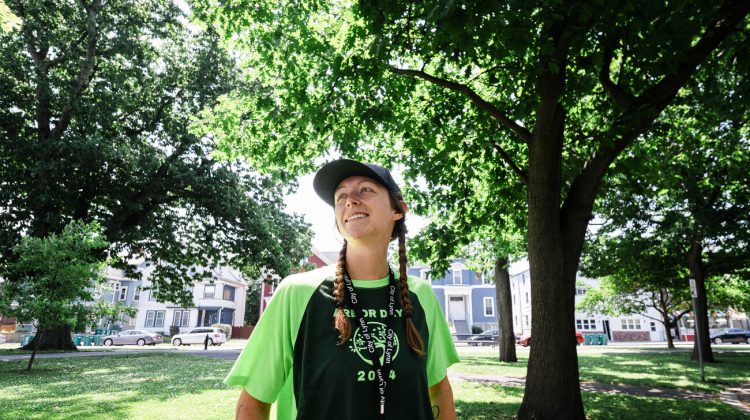LYNN — Just as Lynn was poised to grow one of the most ambitious municipal forestry efforts in its history, federal funding cuts have abruptly halted the program, casting uncertainty over tree planting plans, youth jobs, and the city’s environmental goals.
The city’s first-ever Urban Forest Plan, launched last year with a $550,000 grant from the Inflation Reduction Act (IRA), aimed to plant 150 trees across underserved neighborhoods, build a skilled local workforce, and create lasting environmental infrastructure. But in February, the U.S. Department of Agriculture terminated the sub-award contract — administered by the Arbor Day Foundation on behalf of the USDA — that funded Lynn’s program. The move pulled the plug on more than $469,000 in remaining funds.
“I immediately fell in love with this job,” said Urban Forestry Fellow Erica Holm, who has led the city’s efforts since her hire last June. “Every tree we plant is like a baby. It’s about care — care for each other and for the future.”
Holm came to Lynn after five years in Boston’s nonprofit greening world and more than a decade in urban forestry. She holds a degree in Wildlife and Conservation Biology from the University of New Hampshire and earned her ISA Certified Arborist credential through weekend training and side jobs to gain hands-on experience.
“I really belong in public service,” Holm said. “Tree people are great people. This was a role designed to make real differences on the ground — tree by tree, constituent by constituent.”
The funding cut threatens more than just trees. It jeopardizes Lynn’s first forestry-focused youth employment initiative — $72,000 had been earmarked to hire 25 high school students this summer — and stalls broader public engagement strategies. As of the termination notice issued on Feb. 21, only 32 of the 150 planned trees had been planted. Holm estimates the city can now afford to plant only five more this spring.
Still, the program has brought Lynn new recognition. Holm helped the city earn its first Tree City USA Growth Award this year, building on its 35-year Tree City USA status. The award recognized work that includes the formation of the Lynn Tree Committee, the launch of early-career training, and expansion of public education around urban forests.
Mayor Jared C. Nicholson called the situation “extremely disappointing,” but emphasized the City’s determination to keep the work going.
“We are trying to work through various options,” Nicholson said. “The City remains steadfast in our commitment to improving and nurturing our urban forest. There has been invaluable work thus far, led by Erica and the Lynn Tree Committee, and we will strive to build upon their foundation despite this setback.”
That foundation includes a growing coalition of Lynn residents and volunteers who have rallied around the city’s forestry goals. Among them is Susan H. Brown, a longtime resident and Tree Committee member, who spent years advocating for a coordinated urban forestry effort before Holm’s arrival.
“We now have a committed Tree Committee and an amazing Urban Forest Fellow to do just that,” Brown said. “Trees have been planted, alliances have been formed, and residents young and old are excited about adding natural beauty and health benefits to our city.”
Brown said she is especially hopeful about the program’s planned youth engagement initiatives — positions that would have provided paid and volunteer opportunities, mentorship, and skill training.
“If I was a youth, I would jump at the chance,” she said. “The youth, and their mentors, are my hope for now and the future.”
While the Department of Public Works and the state-run Greening the Gateway Cities Program will continue planting and maintaining trees, the broader vision for an inclusive, equity-driven, citywide forestry initiative now hangs in the balance. Lynn still lacks a full tree canopy assessment and street tree inventory — two foundational tools for long-term urban forest planning — that were intended to be developed with IRA support.
Neighborhoods in southern Lynn, where persistent urban heat island effects and low canopy coverage overlap with lower-income communities, were expected to benefit most. Without detailed mapping, Holm said, “we don’t know the full extent of the disparity — but we do know where the need is greatest.”
A formal dispute of the grant termination has been submitted to the USDA by the Arbor Day Foundation, with backing from city officials. U.S. Senator Edward Markey’s office has also requested information. As a public official, Holm cannot directly advocate for policy change, but she remains focused on transparency and honoring the relationships she’s built with residents.

